AI, Aviation, and Human Destiny

Today, although largely behind the scenes, airborne machines are learning all the time, and this is burgeoning AI. Machine learning has been used by biologists in aerial surveys of forests and crops. Down next to the tarmac, robot lawn mowers map their work areas and actually learn to avoid obstacles—and they get smarter each time they tidy up the local airport or grass glider field. Are these machines truly “smart”? Not really, although many can “see” with infrared vision and seem very efficient. These drones operate according to a set of programmed rules, much like the autopilots in an airliner.
Another category of AI on the rise is what geeks call “neural networks.” These are nothing more than large collections of computer microchips engaged in what computer aficionados refer to as “parallel processing.” The largest employ millions of components and, although tiny in size, can recognize faces and even pilot chatter. Neural networks are being developed that will recognize the patterns in human piloting during landings and takeoffs, with the goal of making autopilots even smarter.
この記事は Flight Journal の August 2019 版に掲載されています。
7 日間の Magzter GOLD 無料トライアルを開始して、何千もの厳選されたプレミアム ストーリー、9,000 以上の雑誌や新聞にアクセスしてください。
すでに購読者です ? サインイン
この記事は Flight Journal の August 2019 版に掲載されています。
7 日間の Magzter GOLD 無料トライアルを開始して、何千もの厳選されたプレミアム ストーリー、9,000 以上の雑誌や新聞にアクセスしてください。
すでに購読者です? サインイン

Keeping 'em Flying!- The new generation of warbird pilots, restorers and mechanics
The new generation of warbird pilots, restorers and mechanics. Nearly 80 years after the end of World War II, the fighters, bombers, and trainers that defended freedom continue to enthrall and inspire audiences at airshows, thanks to generations of warbird pilots, maintainers, restoration specialists and collectors. In our September, 2022 issue we introduced you to the young warbird pilots, maintainers and restorers who are already beginning to displace more "experienced" warbird fliers and fixers.

The Corsair Maker- Bringing the Vought Corsair to the fleet was a daunting challenge that spanned nearly three years.
When the first production Corsairs exited the Stratford factory in June 1942, Guyton, as seen here, was tapped to manage the flight and production test program. Armament was improved to six wing-mounted .50s, displacing the wing fuel tanks now placed forward of the cockpit which necessarily was moved rearward by 32 inches. Overall length was increased, armor plate added, landing, arresting and tail gear improved, aileron control enhanced, and a new version of the R2800 engine was incorporated. But those significant improvements unearthed numerous idiosyncrasies that would take an extended period to make the Corsair acceptable for carrier operations
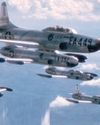
STARFIRES Over Korea
F-94 pilots tangle with MiGs
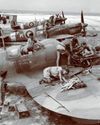
Training Mission
BY THE TIME THIS TRAINING SCENE WAS RECORDED in Canne, Italy, in July 1944, Allied Yugoslavian airmen had several years of experience working side by side with the RAF.
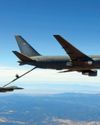
KC-46A PEGASUS
Next generation aerial refueler
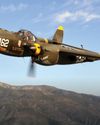
"SATAN'S ANGELS" ACE - Tales from a P-38 pilot in the South Pacific
\"AS A KID GROWING UP on the bow of my father's tugboat, hauling oil from Seattle to Alaska, I had a lot of time on my hands.
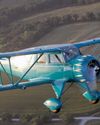
WACO YKC - Stunning and Ultra Rare Golden Age Cabin Flier
BETWEEN THE IMPLEMENTATION of the Air Commerce Act of 1926 and December 31, 1948, all U.S. registered flying machines sported an N-number, much as they do today, the \"N\" being an internationally recognized identifier for the United States. During that period, however, an additional letter-identifier followed the \"N.\" Depending on their category, they were registered in the NC (Commercial), NG (Glider), NL (Limited), NR (Restricted, usually meaning race airplanes), NS (State government), and, finally, NX (experimental).
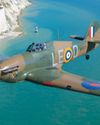
BADER'S HURRICANES
Double amputee fighter ace Douglas Bader and his Battle of Britain Hurricanes
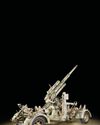
Scourge of the Allied Fighters
IT HAD TO BE THE MOST HELPLESS FEELING in the world: you're at 25,000 feet over Europe knowing that your primary function is to drop bombs-or flying escort for the bombers while being a slow-moving target for some of the world's finest shooters. However, you have John Browning's marvelous .50 caliber invention to give some degree of protection. Unfortunately, you're absolutely helpless against flak. Piloting and gunnery skills play no role in a game where sheer chance makes life and death decisions. For that reason, the Krupp 88 mm Flak 18/36/37 AA cannon could be considered WW II's ultimate stealth fighter. You never saw it coming.
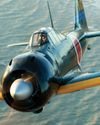
ZERO MYTH, MYSTERY, AND FACT
A test pilot compares the A6M5 Zero to U.S. fighters